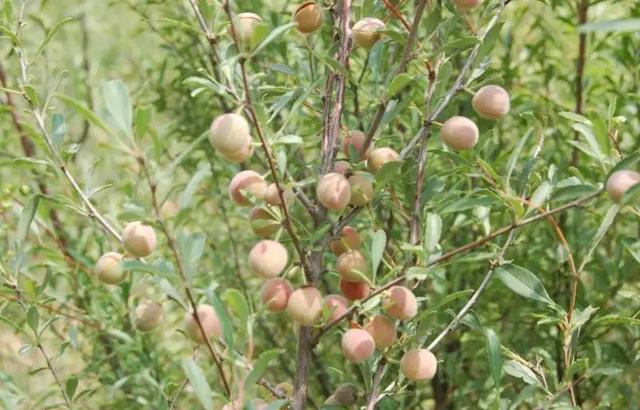Magic tree, edible oil growing in the desert will cultivate 1 million mu of desert flower "wild cherry"
There is only input but no output for desert control and prevention. How can Shenmu, a vast expanse of sand, be turned into a kind of productivity? At the meeting of the Council of Woody Oil Branch of China Federation of Agriculture and Forestry Industry and the Establishment meeting of Woody Oil expert Group held at 9:00 on July 5, 2016, Zhang Yinglong, president of Shenmu County Ecological Protection and Construction Association, told us that Shenmu is further devoting itself to the scientific research and construction of sand control culture.

Shenmu area has been committed to the construction of high-yield demonstration forest of almond as early as 2003. To achieve a bumper harvest of local economic benefits and environmental benefits. After 13 years of continuous research and improvement, the cultivation of long-stalked almond has achieved initial results. At the same time, in the prevention and control of land degradation, the Association actively practices the use of wastes to produce bio-organic fertilizers to protect water resources, promote organic agriculture and provide a strong guarantee for environmental protection.
Long-stalked almond, also known as long-stalked almond, is also commonly known as "wild cherry" in northern Shaanxi, which belongs to Rosaceae, shrub, flowering in May and fruiting from July to August. Born on sunny gravelly slopes or foothills in hilly areas, it is also found in arid steppe or desert steppe. At present, it is planted in Yulin, Inner Mongolia and other places. Is an excellent woody oil shrub species, long-stalked almond kernel can be processed as edible oil, in 2013, long-stalked almond edible oil was approved as a new food raw material by the State Health and discipline Inspection Commission.
In July 2014, the State Forestry Administration approved the establishment of a long-stalked almond engineering and technology research center, which will be closely combined with the major technological needs of China's long-stalked almond industry, aiming at industrial upgrading and production benefits. take technology integration, ripening and transformation as the main means to carry out demonstration technology research and demonstration of long-stalked almond industry. Since 2003, the afforestation area of almond is about 100000 mu.
Zhang Yinglong stressed at the meeting: because of the unique climatic, topographical and soil conditions in northern Shaanxi, it is more difficult to grow almond than in other places. The association first planted almond on a small scale. After the planting technology has formed certain conditions, the promotion and planting efforts will be strengthened. Strive to make the long-stalked almond planted in Shenmu area form an intensive, mechanized and lasting planting pattern. At the same time, the association will also increase the construction of scientific research team and reduce the planting cost of long-stalked almond. In the future, Yulin is expected to invest 1 million mu of almond woodland. Continuously develop and utilize the industrial chain of long-stalked almond, constantly tap the potential of long-stalked almond, and grasp the demonstration model, and then promote it into a "bonsai" in an all-round way.
On July 5, 2016, in order to actively promote and implement the working arrangements of the members of the woody oil branch on March 31, to gather the backbone of the branch and serve the members more accurately, the branch studied and decided to hold the 2016 Council of Woody Oil Branch of China Federation of Agriculture and Forestry Industry and the inaugural meeting of woody oil expert group. The meeting was held at 9:00 in the morning at Tianfeng International Hotel in Shenmu as scheduled.
Present at the meeting were Yang Chao, chief station director of the state-owned forest farm and forest seedling workstation of the State Forestry Administration, Xu Xinqiao, party committee secretary of the Forestry Research Institute of the Academy of Forestry Sciences of China, Wang Haojie, director of the subtropical forestry research institute of the Chinese Academy of Forestry Sciences, and Shi Sheqiang, deputy director of Shaanxi Desert Research Institute, Yulin Forestry Bureau, Shenmu County Government, Shenmu Forestry Bureau, More than 80 leaders and 14 experts, including Shenmu Ecological Protection and Construction Association.
Related
- A course of planting techniques and methods on how to grow carrots
- How to plant the latest tulips?
- Is it better to pick tea in the morning or in the afternoon? When is the best time for tea to be picked? what is the third or fifth tea?
- Launch Yuanxiao Happy combination Haocha + Tea Yuan healthy Taste
- Penghu Tourism "Fireworks 20 Parade with You"
- 2022 West Lake Happiness holds "Digital Revitalization Voucher" and draws iphone13 and laptop.
- Banqiao Fuzhou social houses are designed to change start-up combined with police elimination to create a safe and livable environment
- The convenient measure of "mechanical weeding" in Xinbei has been abused and the Agriculture Bureau has imposed heavy penalties on the illegal land consolidation.
- Changgeng University Joins Hands with Four Memory Factories to Rescue Memory Talent Shortage
- The list of Taiwan's top 100 MVP managers is listed by the Director-General of the Farmers' Association of Sanxia District.



